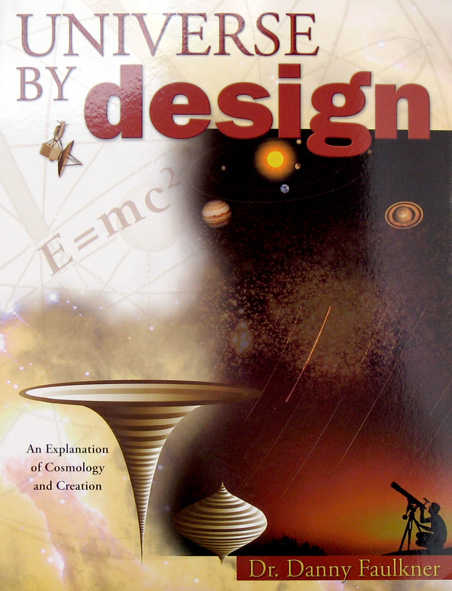Why would a Biblical creationist be interested in the Design argument? Isn’t enough for a creationist to know “God did it?”. No! God also wants creationists to know the level of His genius, and that is where the Design argument has benefit for creationists. Design research will glorify the Creator in ways revealed theology cannot.

To illustrate: a creationist could say “God created birds” but a Design theorist could say “God made birds and there is genius in the design of flight…” The Design theorist then shows the genius of the Creator rather than merely asserting “God did it”.
Scripture doesn’t describe every design in the universe. There may be designs out there remaining to be discovered. Things a Biblical creationist might gloss over in the study of the universe may one day be found to be suggestive of design. It may be that God did not intend we discover all of His designs via scripture alone, but by studying His works.
If creationists are called to declare the works of God, part of that means discovering the designs in nature that are not described explicitly in the Bible: (like the bacterial flagellum, the DNA code, the properties of the moon etc.).
Like an engineer reverse engineering a device he already knows is designed, he may not realize that some of the features may conform to designs he doesn’t not yet recognized. It may be important, for example, for him to discern whether what he is looking at is:
1. a broken design
2. a real design that just looks like a broken design
3. an illusion of design
I accept biology is designed, but nobody knows the entire catalogue of designs which God has placed in the biosphere. Design theory can help identify those designs. In that context, CSI is a credible tool for creationists.
If there are broken designs in biology, or steganography in biology, this may have medical research implications. It cannot be deduced from scripture alone! There may be designs in the cosmos which scripture won’t describe explicitly, but which the Design argument can detect.
Faulkner is one of the few leading creationists that also advocate the Design argument, and he seems to understand the Design argument as a separate line of thought than mere creationism. Creationism descends from scriptural theology, whereas the Design argument proceeds from natural theology. Even Eugenie Scott observed the obvious differences between creationism (that comes from scripture) vs. ID (that comes as interpretation of physical evidence):
ID is a lineal descendent of William Paley’s Argument from Design (Paley 1803,)
Eugenie Scott
NCSE
One of Faulkner’s essays has an interesting observation in Angular Size of the Moon…An argument for Design that is supportive of some Design arguments and cautious of other Design arguments:
For some time this author has been concerned with the design argument in astronomy. In discussing biological systems, the design argument can be very powerful. For instance, if gross properties of the earth, such as atmospheric composition or gravity were altered, life would be impossible. If the sun’s size and temperature or the earth’s orbit were different, life would again be endangered. The same can be said for atomic properties of matter, such as the many bonds that carbon can form, or the status of water as the universal solvent, or the unique property of water expanding upon freezing. In short, the design argument is a demonstration that nature must be as it is, or else life as we know could not exist. Even evolutionary scientists have recognized this fact and have coined the term the “anthropic principle” to describe it (Barrow and Tipler, 1986).
Creationists often attempt to extend this very powerful design argument to astronomical topics as discussed here. But the design argument for the earth-moon system presented here is a much weaker one than is usually presented for biological systems. If the earth-moon system were not unique, or if total solar eclipses did not occur, life would not be imperiled. In other words, while the earth-moon system may demonstrate the Creator’s imagination and concern for our enjoyment, it must not be thus for our existence.
Just as Barrow and Tipler define weak and strong anthropic principles, perhaps creationists should adopt the terms weak and strong in discussing design arguments. Many of the astronomical design arguments, including the one discussed here, would be of the weak variety. Even more basic would be a definition of design and a methodology in consistently applying the design argument. At this time it appears that this definition and methodology do not exist, because most people assume that design is readily recognized. If this is the case, then two criticisms readily come to mind. First, many may see design where none actually exists. Second, a sort of circular reasoning may develop where people see design because they know that it must exist, while others of the different persuasion fail to see the evidence.
It is hoped that other creationists join in the discussion to define and refine the design argument.
Faulkner is also author of Universe by Design. Amazon describes it:
The universe was created with purpose and reason; and modern science with all of its experiments, exploration, and sophistication has never proven otherwise.
Danny R. Faulkner, Ph.D. , is a Full Professor at the University of South Carolina, Lancaster, where he teaches physics and astronomy. He has published about two dozen papers in various astronomy and astrophysics journals.
Faulkner is keynote speaker at the upcoming Creation Astronomy Conference at Concordia University in Wisconsin July 8 – 11, 2013. If any of the readers are attending, look for me there, I just decided to go since my schedule freed me up.
[posted by scordova to assist the News desk with content and commentary through 7/7/13]